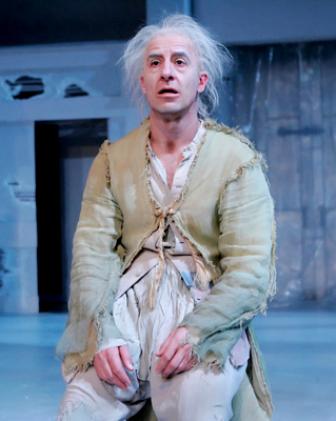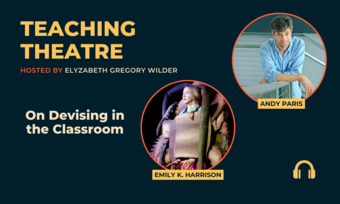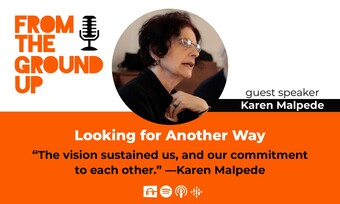Interview with Steve Epp
Cory: It seems that over time—with Theatre de la Jeune Lune and now with the Moving Company, you’ve become sort of the resident writer. Were you always a writer or were you an actor first?
Steve: I was definitely an actor first, but the idea of generating material for the stage, in whatever form, is what I’ve always done. But it’s evolved enormously over the years in terms of how we do it and my relationship to it. Early on, with Jeune Lune, we’d be working from a specific translation or adaptation of a play and it wasn’t particularly right and we were always reinventing things for ourselves and there was writing that would happen. I enjoy the process of starting from an idea and beginning to map out how to imagine it for the stage. And the way we’ve always worked is that all of the elements (text, design, actors) are at play simultaneously, everything is influencing everything else.
Cory: I’m curious about The House Can’t Stand, the first show you and Dominique Serrand did after Jeune Lune closed. That actually felt much more like a conventional text because it was so language-based. I could imagine that maybe you wrote it alone and then brought it to Dominique?
Steve: That was pretty much the process.
Cory: Having worked so often writing with an ensemble in the room, how did you find the process of just writing a play alone and then bringing it to a director?
Steve: Well, you know, initially, it was really terrifying. Because we used to always be working together, so you’re always bouncing your ideas off everyone in the room, which can be, as you know, incredibly frustrating. But it’s also that thing of, “well, I don’t have an idea here, but somebody else does” and that sort of gets you going. So with The House Can’t Stand it was, “Okay, it’s just me.” You know, the playwright up in his “garret” or something. The sort of thing we used to make fun of. Like the worst way to write a play is a person alone, sitting in a room! But there I was. Because we’d lost everything! There was nobody.
Cory: All you could really afford was a computer.
Steve: Yeah, you know there’s that thing, you come down to it—well, we can write. That doesn’t cost anything. But you don’t have other people to bounce ideas off of… and you can get lost in that. Then there was that sort of classic step. I was taking this long drive out to Wisconsin and I was in the thick of trying to really get this thing mapped out in my head. I had written little bits of things and there was enough there that, as I drove, the whole thing fell in place. That’s usually what happens. Once you get a few toeholds and hooks into the thing then you can start—and sometimes it’s finding the right source—you know I need to work from sources. Getting started you think, we can build this whole thing out of the language from this book, or I’ll steal this stuff from Shakespeare and that gets me going, that’s my toehold, but ultimately that’s the stuff you end up cutting.
Cory: But it leads to something else.
Steve: It’s what got you going. And I actually think it’s a very viable way to work. You steal either from somebody else, or from yourself. And by doing that you’re going to find something new that you’ve never done before.
Cory: In the last two shows you’ve done there’s this looking back at American history—the Lincoln presidency with The House Can’t Stand and looking at the Mississippi River flood of 1927 for Come Hell and High Water. There’s this feeling of looking back at the past to illuminate something about the present. When people think of the work that you and Dominique do, they don’t necessarily think of this sort of epic Americana.
Steve: I’ve always had a real strong interest in history, where things are rooted and where they come from and I actually think Jeune Lune always did too, in a different sense. The founding of the company was about going back and looking at these traditional performance disciplines whether it’s clown, commedia, Greek tragedy, sort of the “root” forms of theater. But the whole point of the Jacque Lecoq school and its pedagogy is that you study those and work from those, but then create something for an audience now. So in a way, that sort of larger gesture in the world has always been there; of going back to the past in some way, shape, or form and using it as a way to talk about something now. We were never interested in doing museum theater, of doing just another production of whatever. Even when we were adapting an old play, internally, we always talked about what is the central theme of the play now? When we chose to do Tartuffe, in the way we did Tartuffe, it was as a way of addressing a certain kind of shifting in terms of religious fundamentalism. The same thing with The Miser. The theme of greed and to what degree it has permeated so many parts of American society. So, in a way, it’s always been the way we think.

Photo by Michal Daniel
Cory: But you’re also devising plays about American history. There aren’t many people that seem to do that. You rarely go and see plays that are historical.
Steve: We have an interest in the past and all those touchstone moments that have led to who we are. I do think there’s a problem that we don’t know our own history, so we don’t quite know how we got to where we are and why. It’s part of our own mythology and whether it’s true or not, it’s some element of our poetic character. And it makes the way of looking at the world we’re in today richer, more layered. It also addresses the fundamental question—what can the theater do? There’s journalism and there’s documentary film and they can go into such in-depth analysis and really lay the story out and give you the facts, which is what they should do, but that’s not really what the theater does well. The theater needs to take you some place and give you an experience, an emotional experience that hopefully is also not mind numbing, but mind stimulating. It doesn’t mean it has to be intellectual or academic. Hopefully, it isn’t. You know, you’re laughing at stuff that’s genuinely funny and surprising and you’re visually struck and stimulated and you fall in love with these people onstage and you find yourself incredibly moved. To me, without sounding hokey about it, that’s the bottom line.
Cory: Tell me about the show you and Dominique Serrand are going to create for Center Theater Group.
Steve: It’s based on the life of Ahmad Shah Massoud who was the head of the Northern Alliance in Afghanistan. He is considered actually one of the greatest military tacticians of the 20th century, a mastermind of guerilla warfare. He completely figured out how to use the terrain that he knew very well of the mountains in Afghanistan to thwart the Soviet Army. Following that, he was involved in trying to establish a new government in Afghanistan, which immediately disintegrated into civil war for four years, which gave rise to the Taliban. He was considered by Bin Laden to be the only thing in his way and Bin Laden arranged to assassinate him. Two guys carrying a bomb in a camera were trying to get an interview with him, posing as Moroccan journalists and finally on September 9, 2001, Massoud gave them the interview and they blew him up. Two days later, 9/11 happened.
The theater needs to take you some place and give you an experience, an emotional experience that hopefully is also not mind numbing, but mind stimulating.
Cory: And it sounds like you’re going to tell a lot of the story, not just the last few weeks of Massoud’s life.
Steve: We’re going at everything, but I’m thinking about it in terms of the license Shakespeare would take. Go back and tell the story historically, but cheat and embellish for dramatic purposes.
Cory: This project makes me think of what you said earlier about myths and our history. But although this story affects American history in so many huge ways, it’s not an American story.
Steve: No, not at all. But that’s what hooked us. America has this relationship now with Afghanistan, but there’s so much we don’t fully understand. So it’s a way of touching on 9/11, the war in Afghanistan, but also the US’s failures and interventions before 9/11. It’s a way of looking at all of that, but through a very particular character that we, as Americans, don’t know anything about. If you mention Massoud to most anyone here, they have no idea who he is. But for certain parts of Afghanistan, he’s like the way people here talk about Martin Luther King. You hear people talk about him and it’s like they’re talking about Jesus. But that’s tricky too because he has to be human. So how do you get that guy on stage in a way that’s believable and interesting?
Cory: I read recently, someone wrote that creating work as an ensemble is the future of the American Theater. Having done this kind of work for so many years, I was curious what your perspective is on that.
Steve: When we used to have to explain how we work, people didn’t know what the hell we were talking about. And it wasn’t accepted as being a viable way and you certainly could feel that in the critical community. There was always sort of a sense of, “Well, it’s created by a bunch of people and the production is cool, but obviously it’s not a ‘play,’ so it’s not quite viable.” Even with groups like Theatre Soleil, which was a model for us, even if the scripts get published at times, you rarely see somebody doing their work as opposed to whoever the latest playwright is. Their play makes it to New York and everyone does that play around the country. We’ve never seen that result. I mean, nobody does our work and I don’t know if they could and I don’t know if there’s any point. And so I don’t know, in terms of the future of the American theater, I’m not quite sure how that works. What’s the end result that can be passed on? But I do think that people are getting up to speed on the value of this form of creation. A really great playwright can write a really great play, or the right group of individuals working in the right way together can create an incredible piece of theater. But it’s just as likely that none of that will happen. Certainly for us, we’ve found a way that works.
















Comments
The article is just the start of the conversation—we want to know what you think about this subject, too! HowlRound is a space for knowledge-sharing, and we welcome spirited, thoughtful, and on-topic dialogue. Find our full comments policy here
One of our era's great actors, a pioneer in ensemble work, and a really really smart guy. Thanks for this.